Wednesday, March 27, 2024. Annette’s News Roundup.
I think the Roundup makes people feel not so alone.
To read an article excerpted in this Roundup, click on its blue title. Each “blue” article is hyperlinked so you can read the whole article.
Please feel free to share.
Invite at least one other person to subscribe today! https://buttondown.email/AnnettesNewsRoundup
____________________________________________
Joe is always busy.
Some place, some person always needs compassion and help.
This is a big one.
To the people of Baltimore:
— President Biden (@POTUS) March 26, 2024
We’re with you in the wake of this devastating bridge collapse – and we’re going to stay with you for as long as takes. pic.twitter.com/cgnsSjdjHf
This is presidential leadership. Biden on what happens after Francis Scott Key Bridge collapse, "It's my intention that the federal government will pay for the entire cost of reconstruction in that bridge. I expect the congress to support my effort." pic.twitter.com/KN9fWUhPqs
— Sarah Reese Jones (@PoliticusSarah) March 26, 2024
Kamala and I aren't done lowering health care and prescription drug costs and improving health care for the American people.
— President Biden (@POTUS) March 26, 2024
Here's our plan to build on that progress: pic.twitter.com/al3XY65rB8
Kamala too.
Today, @POTUS & @VP Harris delivered remarks in Raleigh, NC about making healthcare more accessible and affordable.
— best of kamala harris (@archivekamala) March 26, 2024
📸: Eros Hoagland pic.twitter.com/yqFBqYt45U
.@POTUS and I will make every federal resource available to help the city of Baltimore respond and rebuild following the collapse of the Francis Scott Key Bridge.
— Vice President Kamala Harris (@VP) March 26, 2024
Doug and I pray for everyone affected by this tragedy, and we thank the brave first responders on the scene.
___________________________________________
Reported broadly in print and television media - mifepristone is going to be safe.
Hundreds rallied outside the Supreme Court while inside the justices seemed skeptical about challenges to the FDA’s approval of the abortion pill. @LauraAJarrett breaks it down. pic.twitter.com/8uWp8riV4H
— NBC Nightly News with Lester Holt (@NBCNightlyNews) March 26, 2024
Court majority unlikely to limit access to mifepristone.
The Supreme Court on Tuesday seemed unlikely to limit access to a key medication used in more than 60 percent of U.S. abortions and first approved more than two decades ago. (Washington Post).
Insurrectionist Josh Hawley’s Christofascist wife at SCOTUS today. Pay attention you guys cause the coup continues #project2025 pic.twitter.com/VK1jGfYgvN
— RealSandiBachom 📹 (@realsandibachom) March 26, 2024
____________________________________________
On the Trump Criminal Hush Money case.
First, Trump did this.
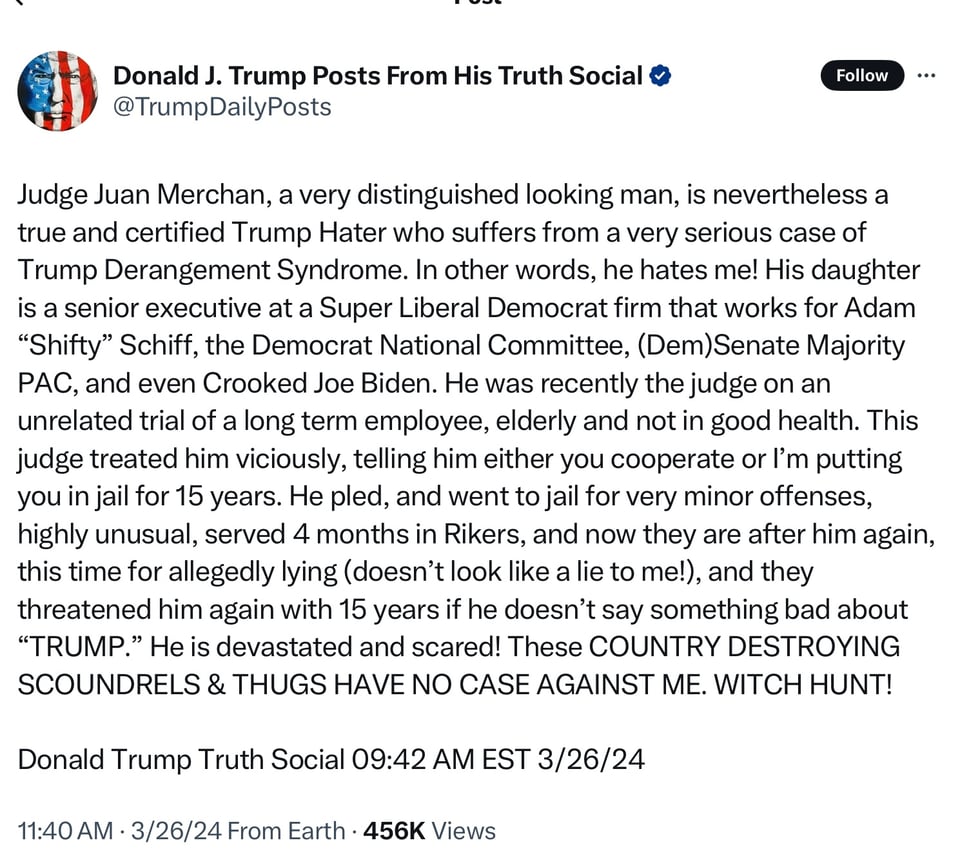
Then this happened.
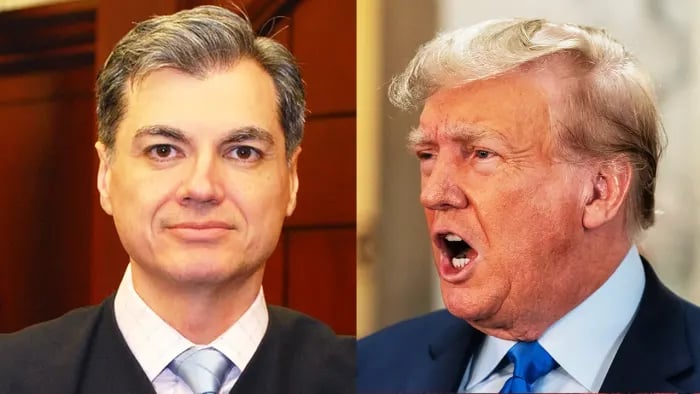
🚨🚨🚨MAJOR BREAKING: The judge in Donald Trump's hush money case in New York has just imposed a gag order on Donald Trump.
— CALL TO ACTIVISM (@CalltoActivism) March 26, 2024
Here are the details:
The order could send Trump to prison if he attacks the judge or any of the witnesses.
Judge Juan Merchan made the move after… pic.twitter.com/uEyOcdMPhf
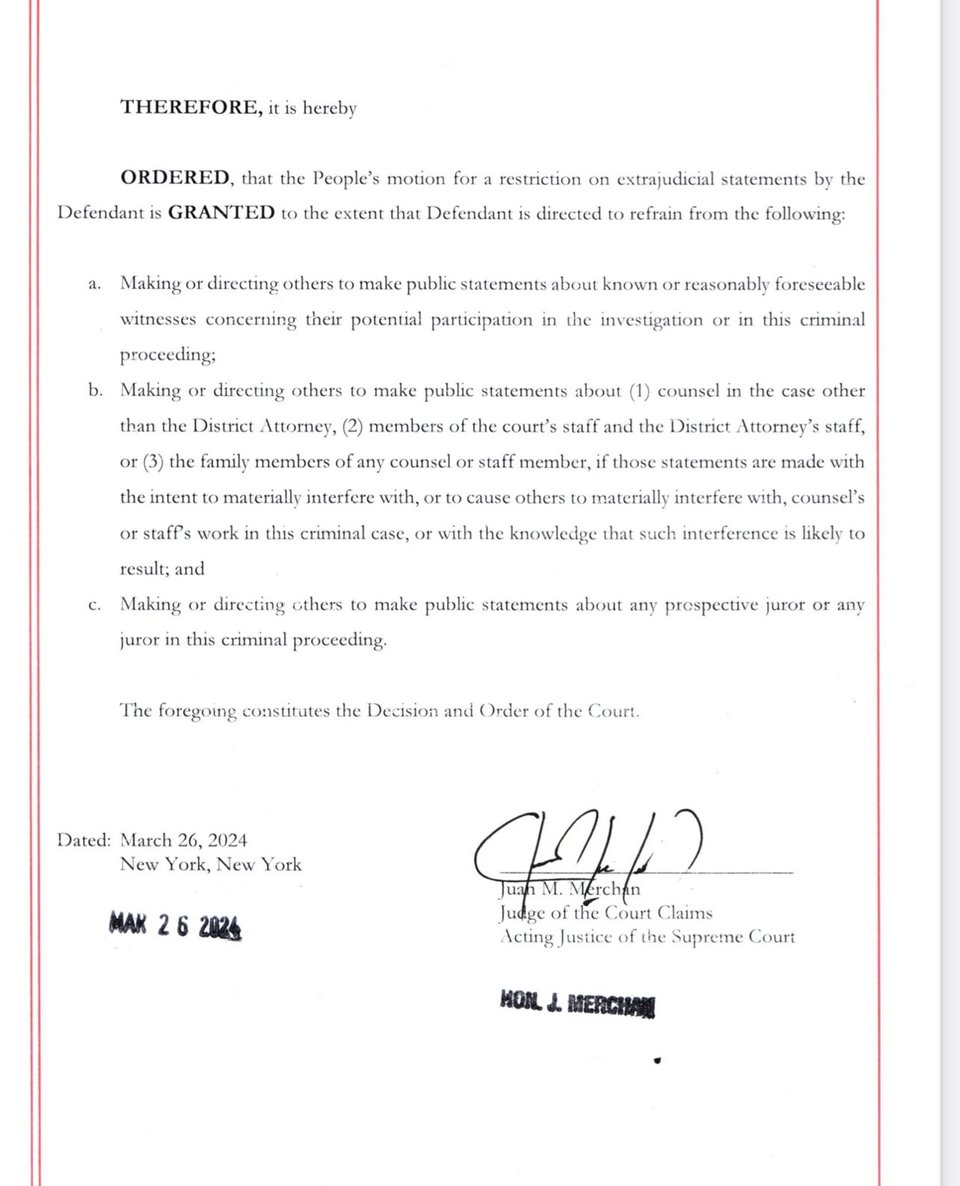
There is no requirement that Trump not attack the President, whatever his name is.
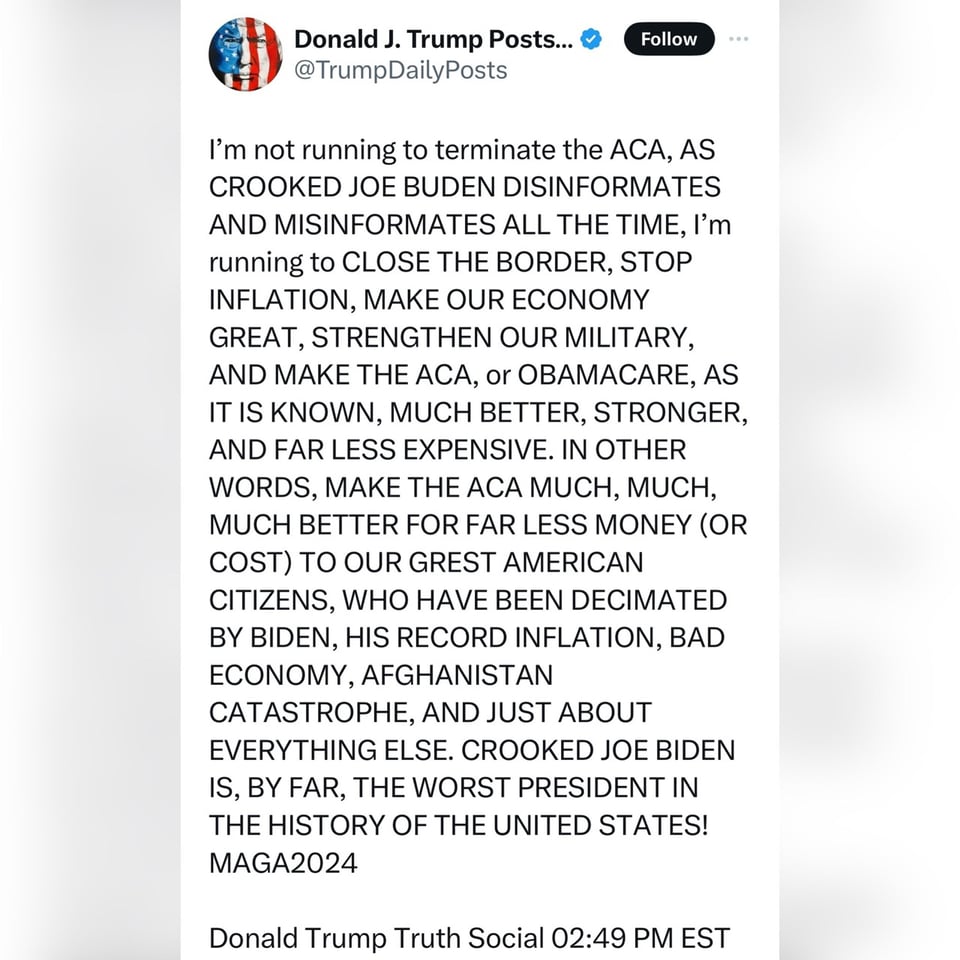
Anyone who reads this and thinks this is a guy who needs control of the nuclear codes should take a cognitive test. pic.twitter.com/d4wt7P25Va
— Chris D. Jackson (@ChrisDJackson) March 27, 2024
____________________________________________
On the Supreme Court and Trump’s infallibility case.
The Supreme Court Is Shaming Itself.
No good legal reason exists to delay Donald Trump’s January 6 trial any further. The Public has a right to Trump’s speedy trial.
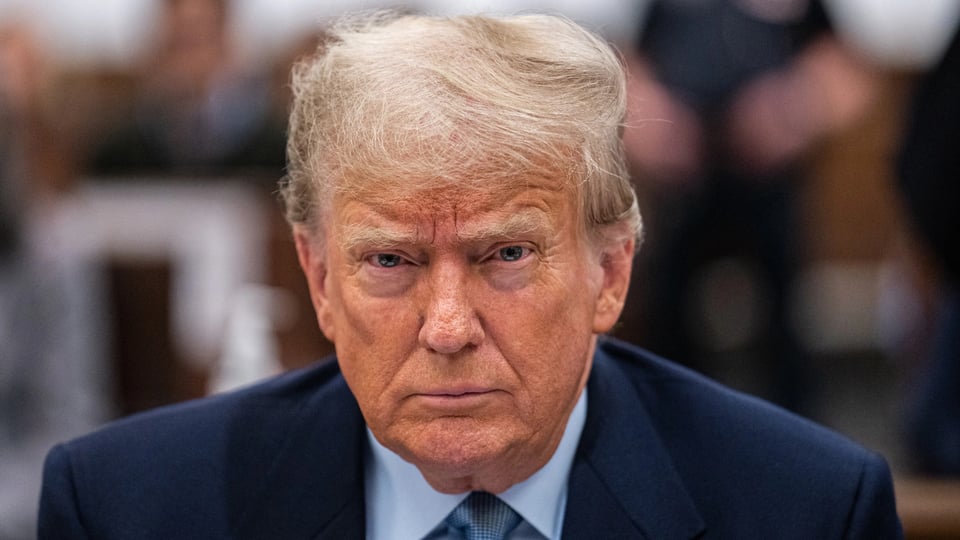
Donald Trump is determined to avoid accountability before the general election, and, so far, the U.S. Supreme Court is helping him.
Trump has no legal ground whatsoever to delay a ruling in his plea for presidential immunity. The reason Trump has nevertheless sought to slow down the immunity appeals process is obvious: to postpone the trial date, hopefully pushing it into a time when, as president, he would control the Department of Justice and thus could squash the prosecution altogether. The Supreme Court has shamed itself by being a party to this, when the sole issue before the Court is presidential immunity. By contrast, Special Counsel Jack Smith has both law and policy on his side in seeking a prompt determination on immunity and a speedy trial soon thereafter. Yet the Court has ignored all
The Supreme Court’s lollygagging is reflected in its scheduling the immunity case for a leisurely April 25 hearing. It’s too late to do anything about that now, but the Court has an opportunity to correct course following oral argument. The justices should press Trump’s counsel on what possible legitimate reason he has to oppose a speedy resolution of the appeal. And then they should rule with dispatch because there is still time, albeit barely, to vindicate the public’s right to a speedy trial.
Let’s recap how we arrived at the present moment. After Judge Tanya Chutkan ruled against Trump’s claim of presidential immunity on December 1 and Trump appealed that ruling to the D.C. Circuit, Smith asked the Supreme Court to hear the appeal immediately, leapfrogging the delay of the circuit-level argument and decision. Trump opposed that, and the Supreme Court declined Smith’s invitation. The circuit court expedited its appeal and on February 6 issued its decision, again rejecting Trump’s immunity argument in toto. Trump then sought a stay in the Supreme Court, and advocated various measures to slow the Court’s hearing of the case. The Supreme Court then deliberated for a couple of weeks before accepting the case for review, and not scheduling the argument until two months later—on the very last day of oral arguments for this session.
Were he not seeking to avoid any trial in advance of the general election so he could maximize the chances of becoming the next president of the United States, Trump would have an interest in a speedy resolution of the immunity question, in contrast to the foot-dragging positions he has advocated throughout the litigation of this issue. Anyone with a legitimate claim of immunity has every interest in not suffering a single day more under the opprobrium of multiple criminal charges, not to mention being under pretrial bail conditions and a gag order. (Trump’s lawyers have argued against his existing gag order, saying it sweeps so broadly as to undermine their client’s ability to campaign for the presidency.)
The law itself recognizes the need for speed on this issue. With questions of immunity, courts permit an appeal in advance of a trial and forgo the usual rule that appeals are permitted only after a verdict is reached. The hope, in allowing for this, is to relieve someone from the opprobrium and burden of a trial, if the defendant is indeed immune. For the Court to set such a prolonged schedule—antithetical to the appropriate time frame for the only issue actually before the justices—speaks volumes about the role the Court has chosen to play in advancing the interests of the former president over the rule of law.
The government has its own interests in seeking a prompt resolution of the immunity issue and a speedy criminal trial (and it has the same interest as a defendant in not subjecting someone to criminal charges who is immune from prosecution). But before delving into the government’s interests, let’s first dispense with a red herring: Special Counsel Smith is not disputing that Trump should be accorded sufficient time to prepare for trial. An inviolable constitutional safeguard is that all criminal defendants must be able to exercise their procedural rights to prepare. Judge Chutkan already weighed the parties’ competing claims. Her decision on a trial date fell well within the mark for similar cases, and that ruling is not on appeal (despite the Supreme Court’s behaving as if it were).
The district judge’s selected timeline (seven months from the August 1 indictment), in a case whose facts and substantial evidence were already available to the defendant, was longer than deadlines set all around the country. By way of comparison, next door in the more conservative Virginia district, defendants routinely go to trial at great speed, without conservative commentators going to the barricades over alleged violations of the rights of the accused. That Trump is a rich, white, and politically powerful man does not mean he should be accorded more (or fewer) rights than others. And Chutkan has said that when the case returns to her, she will give Trump more time to prepare.
With Trump’s rights intact, then, Smith has several legitimate grounds for the immunity appeal to be decided expeditiously and a trial to start as promptly as possible. DOJ internal policy prohibits taking action in a case for “the purpose of” choosing sides in or affecting the outcome of an election. That is unquestionable and not in dispute here. Rather, the point is that well-established neutral criminal-justice principles support a speedy trial. This trial’s outcome, of course, is not known in advance, and it may lead some voters to think better or worse of the defendant and the current presidential administration depending on the evidence and the outcome.
Moreover, the public has a profound interest in a fair and speedy trial. As Justice Samuel Alito wrote for a unanimous Supreme Court, the Speedy Trial Act “was designed not just to benefit defendants but also to serve the public interest.” The refrain that “justice too long delayed is justice denied” has unmistakable resonance in this criminal context. The special counsel’s briefs in the D.C. case are replete with references to this well-settled case law. This means that even when the accused is seeking to delay his day in court, that “does not alter the prosecutor’s obligation to see to it that the case is brought on for trial,” as the Supreme Court has well articulated. Many defendants seek to avoid the day of reckoning—hence Edward Bennett Williams’s famous quip that for the defense, an adjournment is equivalent to an acquittal. The law provides that the public, the prosecution, and most emphatically the courts need not oblige that stratagem.
What’s more, when a defendant seeks to postpone a trial until a point at which he can no longer be prosecuted, the Justice Department may request the trial be held before that deadline. The DOJ’s interest in deterrence and accountability warrants this action. If Trump should win the election, he will become immune as president from criminal trial for at least four years (and perhaps forever by seeking dismissal of the federal case with prejudice or testing the efficacy of granting himself a pardon). The Justice Department can accordingly uphold the public interest in deterrence and accountability by seeking the prompt conviction of the leader of an insurrection. This DOJ need not advance the goals of a future administration led by that very “oathbreaking insurrectionist.”
Another objective of criminal punishment is “specific deterrence,” ensuring the defendant herself does not commit offenses in the future. Given the grand jury’s determination that Trump committed felonies to try to interfere with the 2020 election, there are strong law-enforcement reasons to obtain a conviction to specifically deter Trump. Indeed, in proposing a trial date to Judge Chutkan, Smith quoted Justice Alito, on behalf of the whole Court, that speedy trials “serve the public interest by … preventing extended pretrial delay from impairing the deterrent effect of punishment.”
Trump’s public denigration of the legal system—the incessant claims that the criminal case is a witch hunt—also gives a nation committed to the rule of law a vital interest in holding a public trial where a jury can assess Trump’s actions. Trials can thus serve to restore faith in the justice system.
It is worth noting that when the government seeks its day in court, it simultaneously affords the defendant his day in court—providing him more process, not less. Indeed, the Department of Justice’s so-called 60-day rule—which generally forbids it from taking overt actions in non-public cases with respect to political candidates and closely related people right before an election—is there to avoid a federal prosecutor hurling untested new allegations against a political candidate precisely because he would not have time to clear his reputation before the election. Here, the government is seeking to provide just that forum for Trump to clear his name before the election—to test the criminal allegations against the highest legal standard we have for adjudicating facts—and yet right-wing critics attack Smith. Trump of course wants to avoid that test, but that is an interest the courts should abjure.
The justices still have time to get back on track. Trump’s claim that presidents have absolute immunity should be an easy issue to resolve given these criminal charges. Whether a president should have criminal immunity in some specific circumstances is an abstract question for another day, because efforts to stay in office and use the levers of the presidency are certainly not those specific circumstances. The appeals have delayed matters long enough at the expense of the right of the American people to a fair and speedy trial. Let them not stand in the way of ever having a trial at all.
Andrew Weissmann is a professor at NYU School of Law. He is a co-author of the new book The Trump Indictments and co-host of the podcast Prosecuting Donald Trump.
Ryan Goodman is a professor at NYU School of Law and co-editor-in-chief of Just Security.
____________________________________________
NBC decides to drop Trump sometime-apologist Ronna McDaniel.
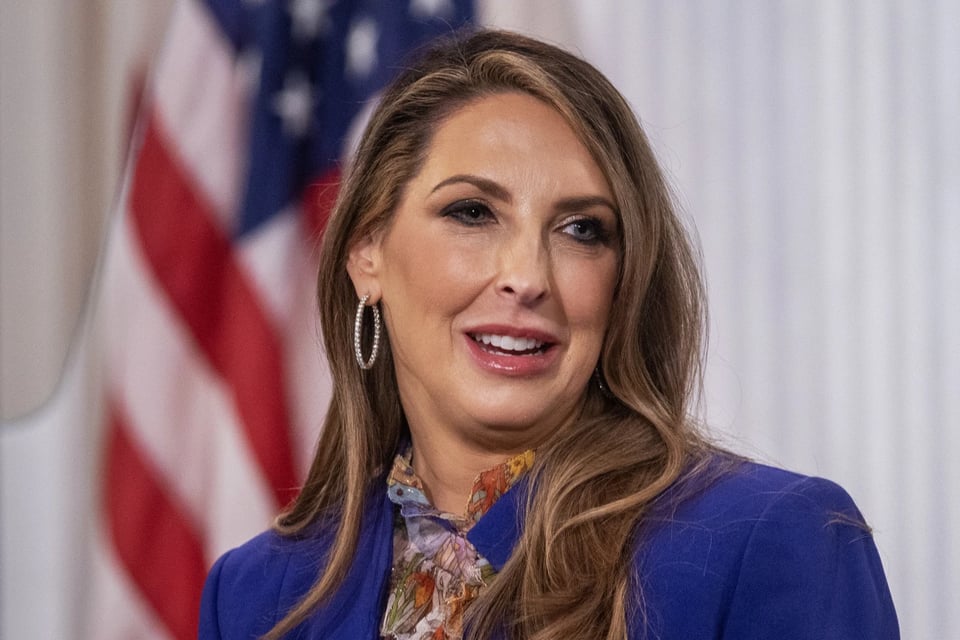
Her agents left.
CAA Cuts Ties With Ronna McDaniel Amid Exit Talks With NBC News.
CAA, the agency that helped broker the recent deal that brought former Republican National Committee chief Ronna McDaniel to NBC News as a political analyst, has parted ways with her, according to a person familiar with the matter, as she wrangles with the media outlet over appropriate terms for an exit.
McDaniel has been advised to seek an attorney to represent her, this person said.
A representative for CAA did not respond immediately to a query seeking comment.
Senior executives at NBC News were meeting Tuesday to discuss how to handle the thorny question of McDaniel’s presence on the outlet’s roster of contributors after several of the most prominent anchors at the outlet its sibling, MSNBC, including Chuck Todd, Nicolle Wallace, Joy Reid and Rachel Maddow, rebuked the decision to hire her on air.
Other TV-news outlets have tested similar hires. CBS News generated internal backlash last year when it named Mick Mulvaney, a former Trump chief of staff, as a political analyst. The relationship did not last long; Mulvaney now works as a contributor for Nexstar Media’s NewsNation cable outlet.
All of NBC News’ senior executives signed off on the plan to bring McDaniel aboard, according to people familiar with the matter. Yet under an unorthodox corporate structure, most of those people wouldn’t have been tasked with managing McDaniel’s relationships with programs and producers, and therefore had little skin in the game. Since the exit of former NBC News president Noah Oppenheim in January of last year, NBC News has been broken up into smaller units, each with its own leader. The “Today” morning franchise is managed in one unit, “NBC Nightly News” and streaming in another, and newsgathering, “Meet The Press” and “Dateline” in a third. What’s more, MSNBC and CNBC also have separate management teams.
McDaniel’s hire, seen as a bid to gain access to the thinking of the current Republican party, was announced by Carrie Budoff Brown, the NBC News executive who oversees “Meet The Press” and political coverage. But Budoff Brown reports to Rebecca Blumenstein, president of editorial for NBC News, and has little say over how McDaniel might be incorporated into “Today,” MSNBC, “NBC Nightly News” or NBC News Now, the company’s streaming outlet. (Variety).
The reasoning isn’t right, 👇 but at least Ronna won’t reach the NBC audience.
NBC News ousts Ronna McDaniel after network’s anchors launch unprecedented on-air rebellion.
CNN —
NBC News on Tuesday ousted former Republican National Committee chair Ronna McDaniel, just days after her hiring as a paid political analyst sparked intense backlash from the network’s top television anchors over McDaniel’s role in subverting the 2020 election and attacks on the press.
“There is no doubt that the last several days have been difficult for the News Group,” NBCUniversal News Group President Cesar Conde said in a memo to staff. “After listening to the legitimate concerns of many of you, I have decided that Ronna McDaniel will not be an NBC News contributor.”
“I want to personally apologize to our team members who felt we let them down,” Conde continued. “While this was a collective recommendation by some members of our leadership team, I approved it and take full responsibility for it.” (CNN).
Maddow laying out the case against Ronna McDaniel pic.twitter.com/WBKchchxnT
— Acyn (@Acyn) March 26, 2024

____________________________________________
April has possibilities.
The Eclipse is coming. So too are the Tulips.🌷
First, Keukenhof, the tulip center in Holland, is opened.

The beautiful spring garden is one of the Netherlands’ premier tourist attractions - but be quick as it’s only open for eight weeks a year.
If springtime flowers fill you with joy, there is one place in Europe which is an absolute must: Keukenhof.
Close to the Dutch capital of Amsterdam, you’ll find vast gardens filled with a staggering seven million - mostly tulip - bulbs.
The Lisse-based floral exhibition is set on 32 hectares (or 79 acres) of land and each bulb is painstakingly planted by one of Keukenhof’s 40 gardeners.
2024 marks the 75th anniversary of the glorious garden. Here’s everything you need to know about it - and how to make a floral visit a reality, when it officially opens on 21 March.

A brief history of Keukenhof garden
The doors to Keukenhof - also known as the Garden of Europe - opened on 21 March 1949.
Established that year by a consortium of bulb growers and flower exporters, it was initially set up to showcase products and support the Netherlands’ export industry.
The following year, the garden opened to the public and was an immediate success, welcoming 200,000 visitors in its first season.
Situated in the municipality of Lisse, just south-west of Amsterdam, it’s now known as one of the world's largest flower gardens.
It dates back to 1638, when Adriaen Maertensz Block, captain and governor of the Dutch East India Company, bought the land and built a large manor house called Castle Keukenhof.
In 1857, then-owners Baron and Baroness Van Pallandt tasked landscape architect Jan David Zocher and his son Louis Paul Zocher - both designers of Amsterdam's Vondelpark - to restructure the park and grounds around the building.
Those designs, in typical English style, still form the basis of the modern day Keukenhof gardens.

(Euronews.travel).
Next month, 200,000 tulips are taking over Union Square in NYC and you can get a free bouquet.
This will be NYC’s first-ever Tulip Day.
Whether it’s the lack of puffer jackets visible on the subway or the emerging cherry blossoms all throughout the city, there are signs everywhere that we’ve finally, officially entered Spring. Nothing embodies our warmer weather mood better than tulips, and Union Square is about to bring us the most incredible display of the flowers that most of us on this side of the Atlantic have ever seen.
So if you find yourself at Union Square on Sunday, April 7 between 11:30am and 3pm and feel like you’ve been teleported to the Netherlands, we won’t blame you, considering there will be a staggering 200,000 tulips on display for the city’s first-ever Tulip Day. The best part? You’ll get the chance to pick a bouquet of ten tulips of your choice for free.
This event is the work of Royal Anthos, an organization that represents Dutch companies that trade in flower bulbs, and the Consulate General of the Netherlands. Tulip Day has been celebrated in San Francisco in the past and the organizers of the event hope to make this an annual New York City tradition.
In the Netherlands, tulip season starts in mid-March and continues through around mid-May. Although the Netherlands is known worldwide for its tulips, they actually first imported the flowers in the 16th Century from what is modern-day Turkey. At one point, tulips were so valuable in the northern European country that they were traded as currency. Today, the tulip industry there is worth billions and more than 75% of all the tulips traded worldwide are grown in the Netherlands, per the Amsterdam Tulip Museum.
This year’s Tulip Day is part of FUTURE 400, an initiative by the Consulate General of the Netherlands to mark 400 years of Dutch New York history. The Dutch arrived in what is now New York in 1624 to establish New Amsterdam, and FUTURE 400 hopes to approach Dutch colonial history through a more complete and honest lens, which includes acknowledging the forcible displacement of Native Americans and repression of communities of color that occurred as a direct result of a European presence on the continent.
The tulips will only be available for a few hours, so make sure to plan ahead to make the most out of the day. To make sure you get your own bouquet, you can pre-register for free here.
(Timeout).